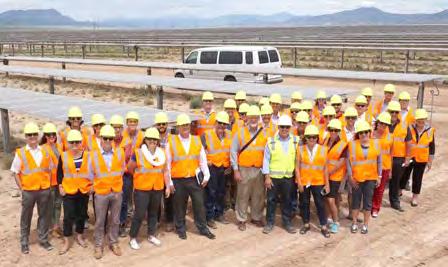
4 minute read
Office of Energy Development
Overview U.C.A 63M-4
The Governor’s Office of Energy Development (OED) is responsible for implementing the state energy policy (63M-4-301) and the Governor’s energy priorities . OED works to advance the development of the state’s conventional and alternative energy and mineral resources, and promotes energy education and outreach . OED does so by convening diverse stakeholders to coordinate shared development and conservation goals, engaging in active energy planning, promoting and implementing policy measures and administering post-performance tax credits and other development incentives .
Advertisement
OED’s Mission is to advance Utah’s diverse energy and minerals sector through planning, policy, and direct engagement with the private sector; and thereby to foster economic growth through energy development and conservation activities and through the provision of affordable, reliable energy .
OED is led by Dr . Laura Nelson, and the office works closely with Cody Stewart, Energy Advisor to Governor Gary R . Herbert .
The Governor’s Utah Energy Development Summit
OED annually hosts the Governor’s Utah Energy Development Summit, which grew to become the largest event of its kind in the west in just three years . The 2015 Summit drew more than 1,100 energy stakeholders and 413 organizations participated in the event, featuring 12 breakout sessions and more than 63 energy experts from around the world . Each year the Summit provides networking and messaging opportunities for business, educational opportunities for non-profits and the public, and a productive policy dialogue for state legislators and others . Overall, the Summit is instrumental in identifying trends in energy
A group of stakeholders including OED and the Economic Development Corporation of Utah visited the Red Hills Renewable Energy Park in Iron County. The 80 megawatt project, developed by SCATEC Solar, will be one of the first utility scale solar projects to be constructed in the state.

development, informing stakeholders of the state’s energy objectives and supporting the advancement of energy opportunities in Utah .
State Energy Program
The State Energy Program (SEP) has been with the state for decades, and is OED’s primary resource in the areas of renewable energy and energy efficiency programs, education and outreach . Through the SEP, OED provides trainings and seminars, offers tax credits to homeowners and business to support distributed generation, and helps partners secure grant funding to support related activities . Through the SEP program, OED is able to reach across the state, including Utah’s rural communities, to improve energy access, encourage economic opportunities and enhance the overall quality of life for Utah’s citizens .
Incentive Programs
The Renewable Energy Systems Tax Credit includes both an investment tax credit for distributed generation projects and a production tax credit for utility scale projects . The investment credit is a one time, non-refundable tax credit based on a percentage of the system’s total eligible cost, and the production credit is a refundable credit based on the actual kilowatt hour generation for each of the project’s first four years . The Alternative Energy Development Tax Credit is an incentive designed to advance the development of large-scale alternative energy resources including solar, wind, and geothermal, as well as oil shale and oil sands . The post-performance incentives are tied to the generation of new state revenue by projects meeting production thresholds, calculated in terms of barrels per day or nameplate capacity depending on the resource type .
The Uinta Basin Applied Technology College is committed to educating the next generation of oil and gas sector professionals, and offers a variety of hands on learning opportunities at its Vernal location. OED staff visits an oil sands project being developed in Uinta County by Canadian firm US Oil Sands. The project, which will commence in the fall of 2015, will be the first oil sands project to be developed in the United States.


The High Cost Infrastructure Tax Credit is an incentive designed to advance rural economic development, particularly agriculture, mining and industrial activity, through the provision of post-performance tax credits . Credits may be authorized for new or expanded projects for which the cost of infrastructure – roads, trans- In 2015 OED partnered with the Utah Clean mission lines, natural gas lines, rail, Air Partnership and the Utah Department etc . – exceeds 10% of the total capital of Environmental Quality to fund multiple expenditure associated with the proj- publicly available electric vehicle charging ect . Credits may also be authorized in stations at Utah Valley University’s Orem campus.other limited circumstances for existing projects making major qualifying investments in infrastructure .
The incentives programs are an important mechanism for directing global capital to investments in the development of Utah’s vast energy resources .
U-Save Energy Fund
The U-Save Energy Fund Program finances energy-related cost-reduction retrofits for publicly owned buildings including state, tribal and municipal governments, as well as school districts, charter schools and higher educational institutions . U-Save provides low-interest loans to assist those entities with the financing of various energy efficiency or distributed generation projects, providing a direct investment in the diversification of local energy portfolios .
Utah Energy Infrastructure Authority
The Utah Energy Infrastructure Authority was created in the 2012 General Session with the aim of helping facilitate energy delivery projects that help to advance responsible energy development in the state . To that end, the Authority Board may authorize tax-free bonds to support the development of any transmission line or pipeline that meets broad criteria related to responsible energy development and rural economic development .

For more information about the Governor’s Office of Energy Development, please contact its Executive Director, Dr. Laura Nelson, at lnelson@utah.gov or 801-538-8726








